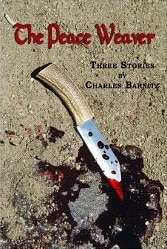Highly recommended: Charles Barnitz's 'The Peace Weaver'

I just finished Charles Barnitz's "The Peace Weaver," and enjoyed it very much. It's set in late 8th century England, but it has a modern tone, dialog, and pacing, which I like. The modern touches are part of Barnitz's plan, I think, of portraying the era as vibrant and full of all the excitements and pleasures (as well as disasters) of life, rather than the grim dull Dark Ages that we often imagine. Indeed, even the most obvious departures from modernity - the Anglo-Saxon legal and political terms that dot the narrative, and even the occasional ethes and thorns - struck me as ways of reminding us that the time was its own civilization, with its own legal system and literate classes (the narrator is an apprentice lawyer/magistrate). Eighth-century Anglo-Saxons didn't think they were living in the Dark Ages, short and cheap as life was then (and in many eras since then).
In any event, it all worked very well for me: the history (which sounds accurate, though I can't vouch for it myself), the plots, the characters, and the details of the writing. I also much enjoyed Barnitz's "The Deepest Sea," though I read it almost 20 years ago; it's set during the same era, though it's more a fantasy adventure, rather than the purely realistic "The Peace Weaver." And I liked Barnitz's recent "Frith Seat," which has the same narrator and protagonist as "The Peace Weaver," though not quite as much as I liked "The Peace Weaver" and (though it's hard to compare books one has read almost 20 years apart) "The Deepest Sea."
"The Peace Weaver" and "The Frith Seat," by the way, appear to be self-published, but nonetheless come across as very professional; it probably helps that Barnitz's day job is as an editor.
